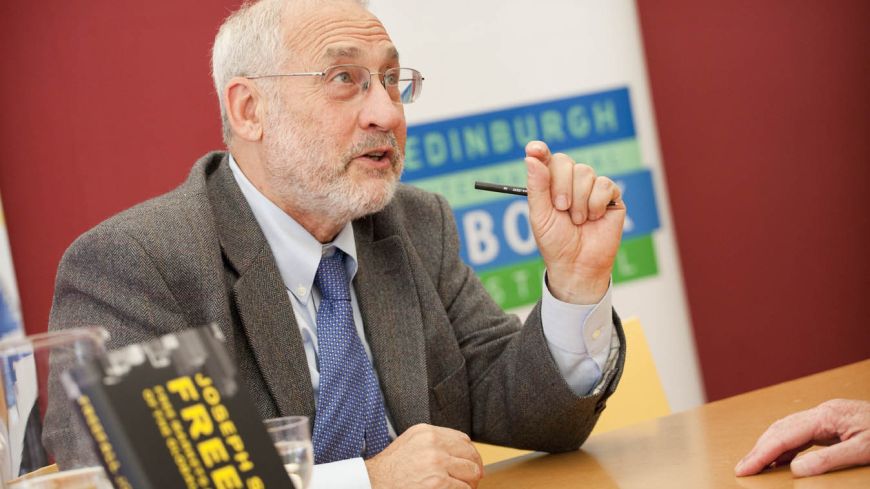
One of the most respected economic commentators of our times, Joseph Stiglitz made a clearly welcome return to the Edinburgh International Book Festival. A number of the audience would have recalled his previous appearance in the same venue a couple of years ago, and Stiglitiz’s return appearance did not disappoint.
His most recent book Freefall: Free Markets and the Sinking of the Global Economy reprises and refines his analysis of our present discontents; the growth of financial "products" whose weaknesses even their designers failed to fully understand, a culture of inflated reward linked to uncalculated risk, the demand that failing financial institutions receive state aid to protect them from the outcomes of their own folly, and the rapid slouch back to the gambler’s den that is a still largely unregulated market at the earliest opportunity. Thus far, thus well known and acknowledged, at least in more thoughtful quarters.
Stiglitz is, of course, more than a mere chronicler of the recent past. His analyses are both prescient and penetrating, and have frequently indicated the most likely unfolding of future events. Stiglitz considers a double dip recession distinctly possible, and seemed to question the wisdom of our present Chancellor in light of this potential scenario.
While government may have to admit complicity in the present situation, Stiglitz implicates elite consumerism also; he pointed out that the US spends (i.e., donates to health insurance companies) some 17% on health, compared to roughly 4% in the UK.
A recent Financial Times feature (July 31st 2010) illustrated the worsening economic plight of the US middle class; it is as if the penthouse-owing minority continually increase their lebensraum to the detriment of those on the lower storeys, whilst at the same time vandalising the lifts and stairways to the upper floors.
The emphasis on growing the financial sector, Stiglitz argues, led to a slackening of control, in turn allowing dysfunctionality to thrive. That it could do so has been the result of de-regulation of financial markets.
The case of Long Term Capital Management in the U S (1998) has led to a culture where bail-out is an expectation rather than an exception. The cry of “Too big to fail” has haunted government ever since. But if banks and other institutions are deemed too big to fail, the rest of us are not; 25% of the US population, Stiglitz assured us, are now homeless or in danger of becoming so.
At about this point, a small group of Climate Camp protesters managed to rush the doors of the RBS Main Theatre to publicise their attempt to lock down RBS headquarters the following day. Stiglitz remained unflappable and Chair Ruth Wishart implacable in the face of disruption.
At more than one point Stiglitz compared the recent financial crisis to a "near death experience" and it’s interesting to consider how unaffected some of our present leaders appear to have been by this.
Questions from the floor were necessarily briefer than might otherwise have been the case, but an interesting one from still-hopeful Labour Party leadership candidate Diane Abbot prompted perhaps Stigltiz’s most interesting observation, that the frequently trumpeted analogy between household and government expenditure is a false one. For a household in financial trouble, the most important thing is to reduce expenditure; for a government the most important thing is to stimulate growth which is taxable – to increase earnings rather than cut spending. A stimulating and undeniably crowded hour.
Event: Sunday 22 August, 3-4pm

